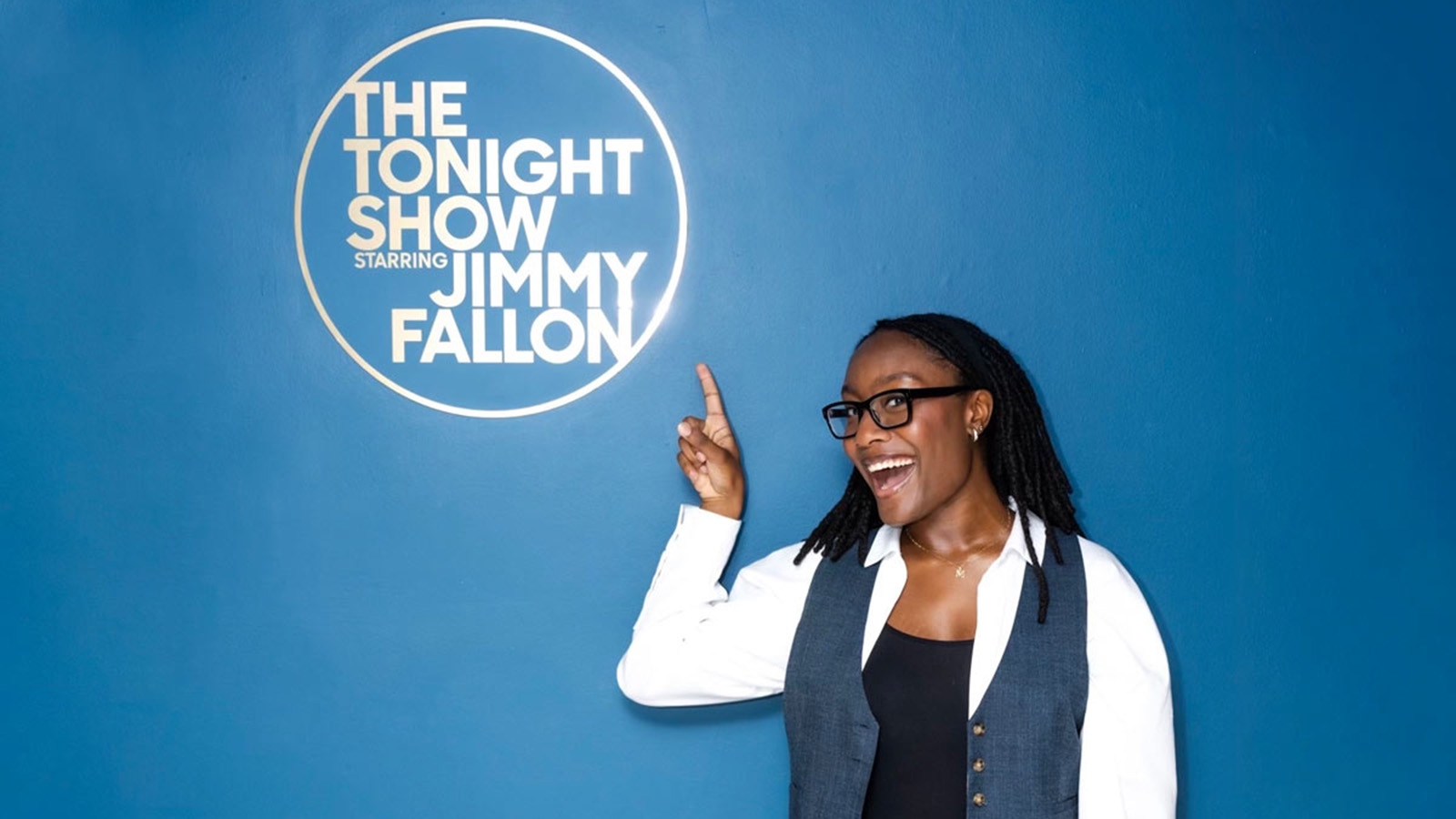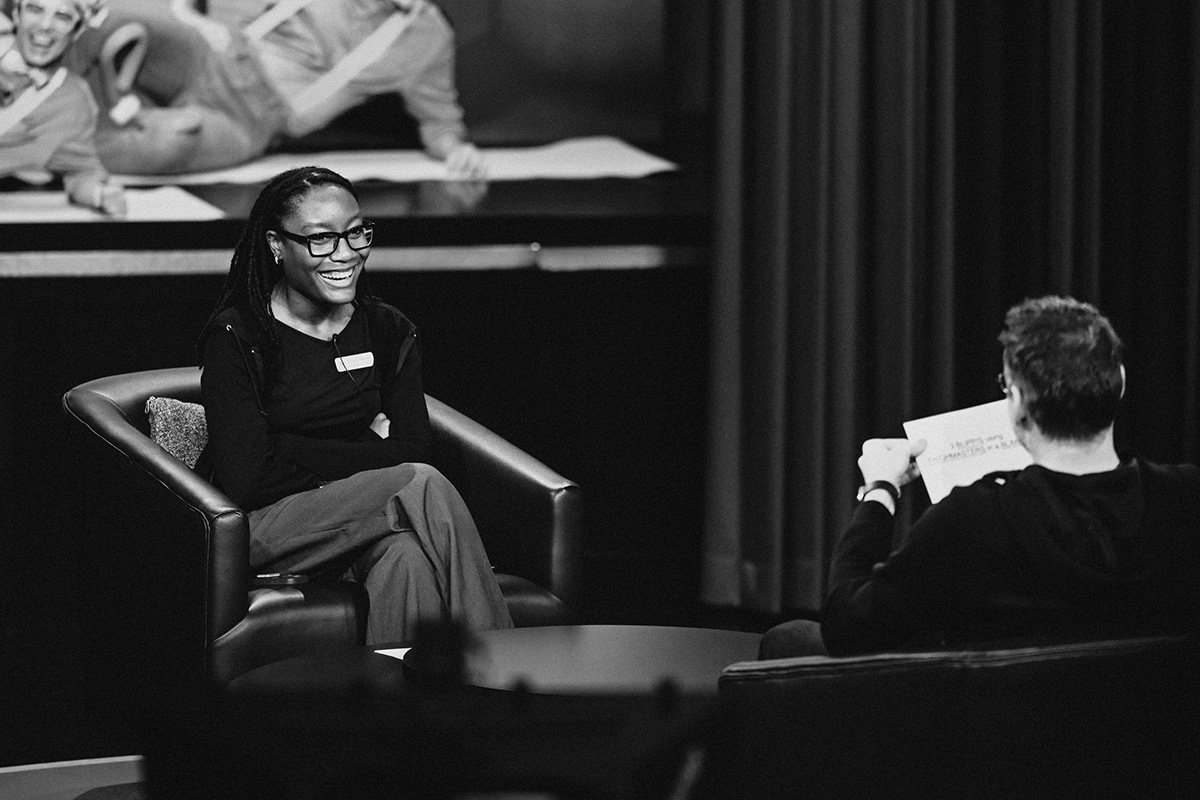Behind the Scenes at The Tonight Show
Crystal Marshall, C’24, just started a master’s degree in film programming and curating at the University of London, as a Thouron Scholar. Before leaving for the UK, she spent the summer as a general production intern on Jimmy Fallon’s show.

(Image: Courtesy Crystal Marshall)
Crystal Marshall, C’24, was supposed to intern with The Tonight Show Starring Jimmy Fallon last summer. After applying for various positions at NBC Universal, she finally landed one. “That was one of the greatest days of junior year. I called my mom, and she immediately started crying,” Marshall says.
A few weeks later, however, Marshall got another email: Due to the strike in Hollywood, the internship wouldn’t be happening after all. She could join a different part of the company, skip the internship altogether, or wait a year and do the one she was accepted into. She chose the latter option.
This summer—following her senior year at Penn and before she headed to the United Kingdom to start a master’s degree program as a Thouron Scholar—she worked as a general production intern for The Tonight Show. She supported the writers, recapping monologues and guest appearances on competing shows. She experienced the control room during the hour-long taping (including when Ariana Grande was guest). Once, she even went in search of a pair of gloves that later appeared in a segment with Fallon and Punjabi actor-singer Diljit Dosanjh.
Marshall, who just began a master’s degree in Film Programming and Curating at the University of London, Birkbeck,is still parsing how the experience might affect her future career, which she hopes can center around education reform, representation in film, archival processes, and audience. Midway through the internship, Marshall shared with Omnia some tricks of the trade she learned, plus what it’s like to be up close and personal with so many celebrities and what’s next on her intellectual journey.

(Image: Courtesy Crystal Marshall)
Did you meet Jimmy Fallon?
Indeed, I did—it actually happened really early on. On the day of a taping, they run through segments in the studio. Sometimes they need extras, so interns will stand in. There’s a game called Freestylin’ with The Roots, where Jimmy asks audience members a handful of questions and The Roots turn it into a song. I rehearsed it once with another intern standing in for Jimmy, and they asked me to come back and do it again with Jimmy. When he asked me my questions later, I was surprisingly calm—I was very proud of myself—and then The Roots played me a song. That was my first time meeting Jimmy up close.
What was it like to be part of the well-oiled machine that is The Tonight Show team?
The people who work on this show care so much about their jobs and are extremely good at it; it’s amazing to see them live. They’re doing really amazing edits in real time. Everyone is so skilled and loves what they do. One thing I noticed on the first day—and it never changed—was how kind people are. There is an acknowledgment of the fact that you’re in the room. They value everything the interns do.
How was it being in such close proximity to celebrities?
You get a really strong understanding that celebrities are just people. I knew that, of course, but it’s different when you see them in person and not just on a TV screen. So many cool people passed through the office all the time, and you saw them talking to those around them, getting ready for rehearsal, being normal and chill. I learned that I can actually keep my cool around high-profile talent.
Rightfully, we weren’t allowed to take photos in the office. You don’t want talent to think you’re trying to sneak photos, which is very fair. But because you’re trying to capture the moment with your eyes, it can also lead to staring—which we’re also not supposed to do, understandably.
Has anyone made you starstruck?
I have to admit, Joseph Gordon Levitt. [Laughs.] I have been a long-time fan, but I just wasn’t expecting him to be the person. It was like, ‘Crystal, stop staring. Stop looking down the hall.’ The worst part is when you’re staring, waiting for someone to pass, and they never do. [Laughter.]
Any sense of how this experience might affect your future study and career?
I don’t know yet. I certainly have a greater appreciation for late night. I had been so gung-ho about film that I didn’t give scholarship around television a strong consideration, especially live TV. I can now see myself doing something that isn’t film, which is freeing.
For my independent study during my junior year at Penn, I started thinking about archives and canon and representing media to audience. I started to think about films as a whole. What does it mean that a film gets lost to time? What allows for it to become physically degraded? Does it affect how we view the history of film, contemporary film, the possibilities of film that so few of the purported “best films of all time” are by women or people of color or queer people? How do we as audience members consider who can be a filmmaker? That has intersected with an interest I had in education.
When I came to Penn, I really thought I was going to reform the U.S. public education system. You couldn’t convince me otherwise. That lasting interest in education and accessible education merged in the last year or two with my interest in film, thinking about who students are learning from when they take a film course and what it means if they never get to watch a diversity of films, not just in terms of content, but in terms of creators and countries of origin and style and duration. In the future, I think my interest will evolve to something even more abstract or really big, maybe more questions about the industry. But I feel like questions I have now are still unanswered, so I’m sitting here for a bit.


